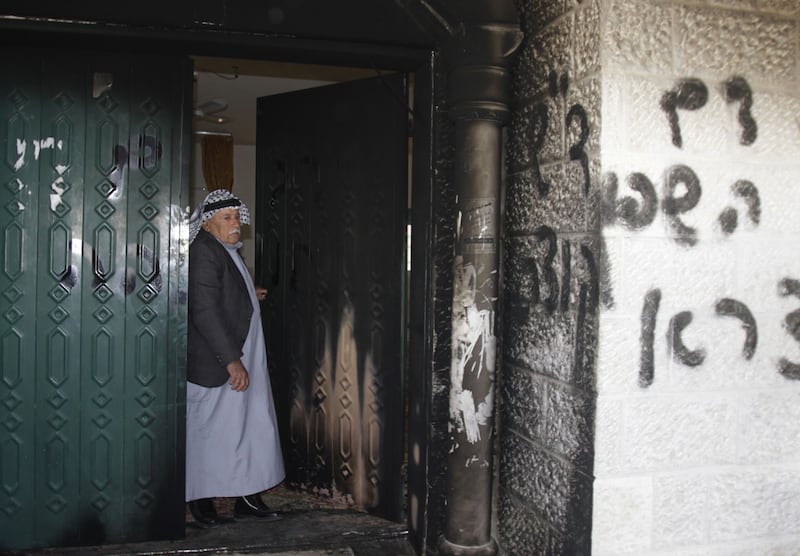QUSRA, West Bank // Israeli settler attacks against Palestinians has almost quadrupled in eight years, supporting claims that Israeli security forces have failed to stem the “pricetag” campaign in which thugs cut down trees, deface mosques and beat Palestinian farmers.
Israeli leaders have repeatedly denounced such attacks — the defence minister last week branded them “outright terrorism” — and the military says soldiers are under strict orders to stop them.
Still, critics say Israeli governments stacked with pro-settler politicians have often been reluctant to confront settlers, even those seen as a hardline fringe.
“There is not enough pressure from the prime minister, the defence minister, the interior minister to prevent this,” said Gadi Zohar, a former senior army commander in the West Bank.
A dramatic incident near this Palestinian farming village last week highlighted the potential of such attacks to escalate and jeopardise fragile US-led peace efforts.
“Price tag” refers to settler attacks on Palestinians in response to army actions against any of dozens of West Bank settlement outposts.
Last week’s events began when troops uprooted olive trees planted on private Palestinian land by settlers from the Esh Kodesh outpost.
Later that day, about 20 Israelis moved towards nearby villages, including Qusra. Palestinians said the settlers damaged olive trees, and were caught by villagers after a stone-throwing clash and held by them for more than two hours before being handed to the army.
Footage of the settlers surrounded by an angry crowd led the news in Israel that day, with commentators saying serious bloodshed was averted by Palestinians who shielded the settlers.
Seven Israelis were questioned and placed under house arrest, police said. The defence minister, Moshe Yaalon, warned he would show zero tolerance, but Palestinians are sceptical.
So far, there have been at least two cases of vandalism in apparent response to the Qusra incident. On Wednesday, residents of a village in the area said the door of a mosque was set on fire and some of the carpet was burnt. Graffiti read: “Blood for blood, Qusra.”
Settlers have damaged hundreds of trees in Qusra, killed 18 sheep, torched six cars and set fire to a mosque in dozens of attacks, said the mayor, Abdel Azim Wadi. The village has lost half its lands to settlements.
Israeli soldiers either stand by during settler attacks or fire tear gas, rubber bullets and occasionally live rounds at Palestinians if the attacks escalate into stone-throwing clashes, Mr Wadi said.
A Qusra man was killed by army fire and dozens were wounded by settlers and soldiers.
Palestinians say “price tag” is part of Israel’s policy of cementing control over the West Bank, the largest of three war-won areas the Palestinians want for a state. They note that Israel has been providing practical support for outposts even though they were set up without government permission.
“Who gives them water, electricity, who gives them security, and paves their streets?” said the Qusra resident Abdel Hakim Odeh, referring to the government’s policy towards the outposts. “These gangs are used by the government against the Palestinians.”
Colonel Eran Makov, deputy commander of an Israeli army division in the West Bank, said soldiers have clear orders to stop any violence between civilians in the territory.
“The policy of the IDF is to interrupt and stop every incident when a person attacks another person.”
Col Makov said soldiers cannot be everywhere at once to block attacks and that it was sometimes difficult to respond rapidly in rocky terrain. In last week’s incident, soldiers responded within 15 minutes, he said.
Col Makov said young conscripts were not necessarily trained for policing jobs, but that those who fail to intervene face disciplinary action. The military has overall authority in the West Bank and soldiers were usually the first to respond to unrest, while Israeli police deal with Israeli civilians, including investigating settler violence.
Indictments were only filed in 8.5 per cent of 825 completed police investigations monitored by the Israeli human rights group Yesh Din. In most cases, investigators failed to locate suspects or collect enough evidence.
In Qusra and two neighbouring villages, residents filed 21 police complaints between 2011 and 2013, but none led to indictments so far. Twelve cases were closed, including a February shooting in which Hilmi Hassan, 28, was seriously wounded in a confrontation with settlers.
“If a settler was shot, they would have imposed curfew on the entire area, but when a Palestinian like me is shot, they accuse him of provoking the settlers,” said Mr Hassan.
Police have formed special units to deal with “price tag” attacks. A West Bank unit with 30 officers began working a year ago, focusing on surveillance, intelligence gathering and undercover operations, the spokesman Micky Rosenfeld said.
The army said Palestinian complaints about settler attacks during the annual olive harvest dropped by half, to 20, from 2012 to 2013.
Despite such efforts, UN figures show a steady rise in the number of settler attacks.
There have been 2,100 such attacks since 2006, the year the UN Office for the Coordination of Humanitarian Affairs (Ocha) started counting. The annual totals are up from 115 in 2006 to 399 in 2013.
In the past eight years, 10 Palestinians were killed by settlers, and 29 settlers were killed by Palestinians. More than 1,700 Palestinians were injured by settlers or by troops in clashes, while 324 settlers and 37 soldiers were hurt by Palestinians in confrontations.
Palestinians also initiate violence, including throwing stones at Israeli motorists. In 2011, Palestinians stabbed to death five members of a family, including three small children, in their settlement home as they slept.
The Yesha Council, an umbrella for more than 550,000 Israeli settlers, said it opposes violence and has distanced itself from price tag.
Mr Zohar said it was not clear if the events in Qusra will prompt a change.
“I don’t think there’s a problem of understanding [the situation],” he said. “There is a problem of [making] a decision.”
* Associated Press





